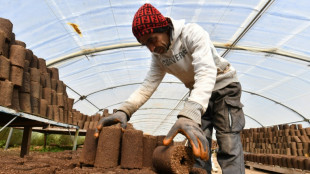
-
 Saka 'ready to go' after long injury lay-off: Arteta
Saka 'ready to go' after long injury lay-off: Arteta
-
Ingebrigtsen Sr, on trial for abusing Olympic champion, says he was 'overly protective'

-
 Tourists and locals enjoy 'ephemeral' Tokyo cherry blossoms
Tourists and locals enjoy 'ephemeral' Tokyo cherry blossoms
-
Khamenei warns of 'strong' response if Iran attacked

-
 France fines Apple 150 million euros over privacy feature
France fines Apple 150 million euros over privacy feature
-
UK PM urges nations to smash migrant smuggling gangs 'once and for all'

-
 Thai authorities probe collapse at quake-hit construction site
Thai authorities probe collapse at quake-hit construction site
-
France's Le Pen convicted in fake jobs trial

-
 Chinese tech giant Huawei says profits fell 28% last year
Chinese tech giant Huawei says profits fell 28% last year
-
Trump says confident of TikTok deal before deadline

-
 Myanmar declares week of mourning as hopes fade for quake survivors
Myanmar declares week of mourning as hopes fade for quake survivors
-
Japan's Nikkei leads hefty market losses, gold hits record

-
 Tears in Taiwan for relatives hit by Myanmar quake
Tears in Taiwan for relatives hit by Myanmar quake
-
Venezuela says US revoked transnational oil, gas company licenses

-
 'Devastated': Relatives await news from Bangkok building collapse
'Devastated': Relatives await news from Bangkok building collapse
-
Arsenal, Tottenham to play pre-season North London derby in Hong Kong

-
 Japan's Nikkei leads hefty equity market losses; gold hits record
Japan's Nikkei leads hefty equity market losses; gold hits record
-
Israel's Netanyahu picks new security chief, defying legal challenge

-
 Trump says US tariffs to hit 'all countries'
Trump says US tariffs to hit 'all countries'
-
Prayers and tears for Eid in quake-hit Mandalay

-
 After flops, movie industry targets fresh start at CinemaCon
After flops, movie industry targets fresh start at CinemaCon
-
Tsunoda targets podium finish in Japan after 'unreal' Red Bull move

-
 French chefs await new Michelin guide
French chefs await new Michelin guide
-
UK imposes travel permit on Europeans from Wednesday

-
 At his academy, Romanian legend Hagi shapes future champions
At his academy, Romanian legend Hagi shapes future champions
-
Referee's lunch break saved Miami winner Mensik from early exit

-
 Djokovic refuses to discuss eye ailment after shock Miami loss
Djokovic refuses to discuss eye ailment after shock Miami loss
-
Mitchell magic as Cavs bag 60th win, Pistons and T'Wolves brawl

-
 Mensik shocks Djokovic to win Miami Open
Mensik shocks Djokovic to win Miami Open
-
Duterte lawyer: 'compelling' grounds to throw case out

-
 What happens on Trump's 'Liberation Day' and beyond?
What happens on Trump's 'Liberation Day' and beyond?
-
Clock ticks on Trump's reciprocal tariffs as countries seek reprieve

-
 Japan-Australia flagship hydrogen project stumbles
Japan-Australia flagship hydrogen project stumbles
-
Musk deploys wealth in bid to swing Wisconsin court vote

-
 Mensik upsets Djokovic to win Miami Open
Mensik upsets Djokovic to win Miami Open
-
China manufacturing activity grows at highest rate in a year

-
 'Waited for death': Ex-detainees recount horrors of Sudan's RSF prisons
'Waited for death': Ex-detainees recount horrors of Sudan's RSF prisons
-
Japan's Nikkei leads big losses in Asian markets as gold hits record

-
 Rescue hopes fading three days after deadly Myanmar quake
Rescue hopes fading three days after deadly Myanmar quake
-
'Basketbrawl' as seven ejected in Pistons-Wolves clash

-
 Four men loom large in Microsoft history
Four men loom large in Microsoft history
-
Computer pioneer Microsoft turns 50 in the age of AI

-
 Trump calls out both Putin and Zelensky over ceasefire talks
Trump calls out both Putin and Zelensky over ceasefire talks
-
Kim Hyo-joo tops Vu in playoff to win LPGA Ford Championship

-
 Economy and especially Trump: Canadians' thoughts on campaigns
Economy and especially Trump: Canadians' thoughts on campaigns
-
Liberal PM Carney takes lead four weeks before Canada vote

-
 SpaceX to launch private astronauts on first crewed polar orbit
SpaceX to launch private astronauts on first crewed polar orbit
-
Australia open door for Kerr's return as Matildas captain

-
 The Premier League's unlikely pretenders to Champions League riches
The Premier League's unlikely pretenders to Champions League riches
-
IFabric Corp Reports Record Q4 and Full Year 2024 Revenues and Strong Profitability


Will big biodiversity ambitions be enough to save nature?
After the world missed almost all of its targets to protect fast-dwindling nature for the last decade, observers following a new round of negotiations are focusing as much on how goals will be put in place as the headline targets.
Nearly 200 nations are taking part in talks until Tuesday, aimed at fine-tuning a draft text to preserve biodiversity by 2050, with key milestones at 2030, which will be adopted at the United Nations COP15 conference later this year.
Countries are striving to increase their ambitions in the face of stark warnings that humanity is driving devastating declines in the biodiversity that supports all life on the planet.
But the world failed almost entirely to reach a similar set of 10-year objectives set a decade ago at UN talks in Aichi, Japan.
"The Aichi targets were largely missed because of lack of political will and parties not prioritising them enough," said AFP Anna Heslop, of the NGO ClientEarth, which is following the Geneva talks.
"There was just a lack of implementation. We can't afford to be in that position again in 10 years."
The text under negotiation includes a series of proposals to avoid repeating the same mistakes.
"What we need is a better system for encouraging parties to plan and report, and then the global community needs to do something. It is keeping these three elements is the challenge," said a delegate from a Global North country, who asked not to be named.
- Progress reports -
Member countries should develop stronger action plans to use natural resources sustainably, said the IDDRI think tank said to be more effective.
There should also be a more robust reporting system, with countries periodically measuring progress and passing on data that feeds into a global assessment, it added.
Currently, each country draws up its national biodiversity plan on a different basis, making comparisons difficult.
To address this, the delegations in Geneva are trying to develop common indicators to measure progress.
"Let's put in place mechanisms for collective and individual review, which will increase the pressure and this affects ambitions and implementation at the national level," said Juliette Landry, researcher at IDDRI.
Experts and conservation groups want national action plans to be updated regularly after COP15 with progress reports and a global stocktake before 2030.
That way, nations and the international community can see if they are going off track and increase their efforts.
But more reporting and administration requires more funding, and biodiversity-rich developing countries stress they will need both financial and technological support to meet these obligations.
"You cannot ask people to do spatial planning if they don't have the means," said a delegate from the Global South.
Another IDDRI proposal is the creation of a compliance mechanism, although Landry stressed that this would not be an exercise in finger-pointing.
Instead she said it would show the "gaps between what the countries had planned and what they implemented" and enable problems to be addressed and for countries to share their experiences, she said. So far, there has been little appetite for such a mechanism.
But without one "all of this process is meaningless" said Oscar Soria, of the advocacy group Avaaz.
"Because nobody will take responsibility and nobody will take the convention seriously from the outside," he said.
P.Mathewson--AMWN

